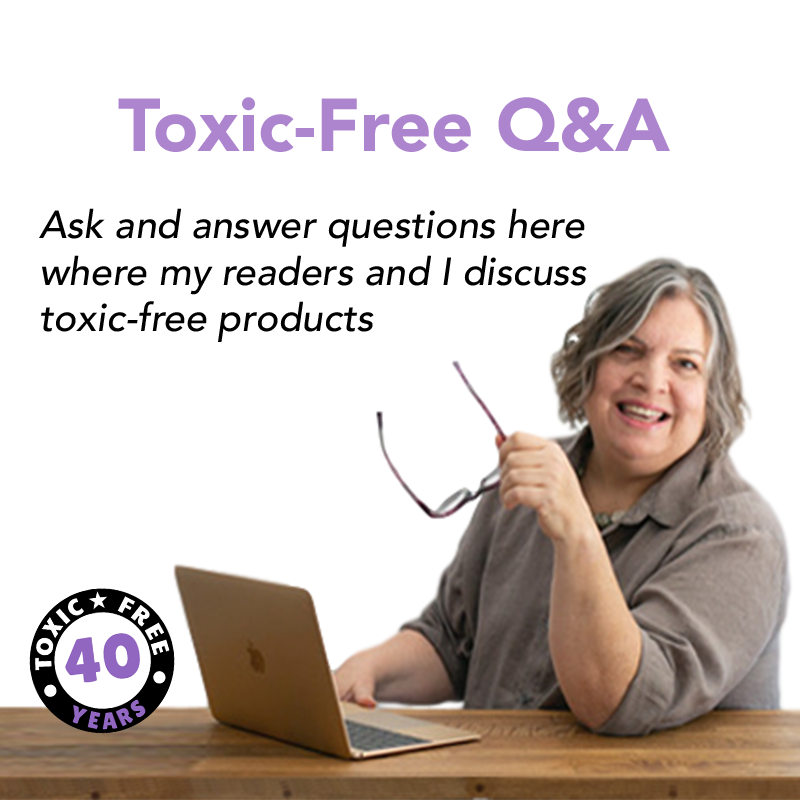
Submitted questions will be posted with my response by the following Tuesday or before.
Submitted comments will be moderated and approved within 24 hours.
Removing Wallpaper and Fragrance-Free Fabric Softener
Question from joseph
What is a way to remove wall paper that was applied 27 years ago. I don’t know what type of glue was used. I have severe MCS. so it has to be fragrance free.
thank you,
joseph
Debra’s Answer
Here are some instructions from DIY Network: DIY: How to Remove Wallpaper
The only problem is that it calls for using fabric softener, and most fabric softeners contain fragrance.
Here are some fabric softeners advertised to be fragrance-free:
Ultra Downey Free & Sensitive “All the softness of Downy without dyes or perfumes.”
Refreshingly Free sells various brands of unscented fabric softener
Readers, any favorite fragrance-free fabric softeners?
Natural Oils in Organic Cotton Towels
Question from green-earth
Hi Debra,
Do you know anything about the natural oils present in organic cotton towels? I need new facial towels and was looking into getting organic. However, what has turned me off is that many stores selling it have stated their organic towels require 5 or 6 washings to get the natural oils out of the cotton. This concerns me because I don’t want these oils/residues ending up in my washer, nor do I want on my skin if I don’t wash them enough. It might cause an allergy? Plus it’s kind of a pain to go through so much effort. Do you know much about these oils/residues? I personally think these companies should sell their towels already washed and ready to use.
Debra’s Answer
Well, I agree with you. There’s no reason why a consumer should have to wash a textile product that many times before using it.
Some people do have allergic reactions to the natural oils in organic cotton. But it’s not toxic.
Tung Oil and Linseed Oil for Furniture Finish
Question from Cecilia
Dear Debra, Are tung oil and linseed oil safe as wood furniture finishes? Pacific Rim uses a blend of tung oil, linseed oil, and Varathane in their furniture.
Thank you!
Debra’s Answer
Tung Oil comes from cold pressing of the seeds or nuts of the Tung tree. Tung trees mainly grow in the mountainous regions of China. The oil has been prized for centuries for it’s qualities as a wood finish. Tung oil penetrates deeply into wood, enhancing the character of the wood while creating a beautiful water-resistant finish. The ancient Chinese used tung oil to waterproof ships.
These qualities make tung oil perfect for wood bowls, counter tops, outdoor furniture, decks, wood siding, wood flooring, concrete, brick and just about any porous surface that needs a nontoxic waterproof protection.
When choosing a tung oil, it’s important to select one that has no additives or distillates. Tung oil labeled “pure” should be just that. Check the MSDS to see if there are any additional ingredient. One tung oil product I checked had 73.77% Stoddard Solvent (aka petroleum distillates), plus Trimethylbenzene, Ethylbenzene, and Cobalt Naphthenate, all very toxic VOCs.
Because the source of tung oil is a nut, people with nut allergies should avoid contact with (or even the odour of) tung oil. Otherwise, pure tung oil is a safe and natural finish.
Linseed oil is obtained from the dried ripe seeds of the flax plant, which is also used to make linen fabric. The oil is obtained by cold pressing, sometimes followed by solvent extraction.
Linseed oil has “polymer-forming properties, which means the molecules have characteristics similar to plastics. Linseed oil is used on its own or blended with other oils, resins, and solvents to make wood finish, to bind pigments in oil paints, as a plasticizer and hardener in putty and in the manufacture of linoleum.
Toxic Finish on Wood Floors
Question from Lynn
My 23 year old son just moved into a house with 2 other people. The landlord had just refinished the floors 2 weeks prior and have since done a second coat. He tried turning up the heat for 24 hours, opening the windows with fans going and then repeating the process for a week.
Apparently the heat source in the house is not so great. He even added some electric heaters. It stills smells awful and he is still unable to live there full time. It has been 7 weeks since the floors were redone. They also put new carpet in his bedroom and he has used an AFM product on it which he may need to repeat.
Any other ideas for the polyurethane smell.? Maybe something topically.
Any suggestions for supplements to help his liver cope?I told him Dandelion and cilantro.
Debra’s Answer
Wow. Do you know what product was used? Sounds like it might be oil-based because a water-based finish should have outgassed by now.
Honestly, this sounds like a pretty toxic place. Can he just find another place to live?
Just to be clear, it’s the solvents that are smelling, not the polyurethane. I don’t know of anything to apply to seal in the odor. What you want to do is cure it.
Here is a great herbal liver supplement that I have taken myself: Liver Balance Plus.
How To Remove Musty Smell from Organic Cotton Mattress
Question from Mommy_of_Sebastian_and_Gabrielli
Hi Debra! I am wondering if there is a natural way to get a musty smell out of my older son’s Naturepedic wool/cotton mattress. It was stored in a closet in our home for a year or so, and now it smells…I guess from lack of air circulation? my husband doesn’t notice it, but I certainly do! It has a waterproof coating on it. It is only two and a half years old, was only used for a year, and cost $300, so I’d like to try to salvage it for my younger son if possible. Thank you for any suggestions you can offer! ~Melissa
Debra’s Answer
Musty odors are the result of moisture in the air, so if you had wrapped it in polyethylene plastic to be water and air tight, this might have been prevented. The odor is from a mold.
I would say try putting it in the sun or a heated room with nothing else in the room, vented to the outdoors.
My concern is that the mold causing the may have penetrated into the mattress. This would depend on the amount of moisture.
Breathing musty air can cause respiratory problems, so if you can’t clean this up to the point where you can’t smell it, it would be better and less expensive in the long run to get a new mattress.
You also might contact Naturepedic with this question.
Odor Eliminators
Question from nancy williams
Hi Debra, Do you know whether any chemically sensitive people have been able to tolerate a new product called “Zero Odor”. It is proprietary ingredients, but claims to encapsulate the odor molecules, and eliminate them rather than covering them up. I am having difficulty finding a used minivan with stow and go seats, as they all have smoke or air fresheners. This recent product says it works on smoke odor. Thank you.
Debra’s Answer
Has anyone tried Zero Odor?
Looking for a link to their website, I also found SCOE 10X “Immediate & Permanent Odor Elimination Technology.” They say it “is completely non-toxic, hypoallergenic, biodegradable, environmentally friendly and very safe to use. SCOE 10X ;contains no biocidal properties whatsoever.”
“SCOE 10X contains no fragrances, alcohols or solvents (found in most other odor eliminator products like Febreze, ZeroOdor and Urine Gone) which are potentially dangerous.”
Anyone tried SCOE 10x?
Bamboo Bedsheets
Question from Julia
Are Bamboo bedsheets that are 100% viscose safe for people with MCS? If not, what kind of chemical free sheets do you recommend?
Debra’s Answer
As always, I cannot recommend anything as “safe for people with MCS” because each person with MCS has their own individual sensitivities, often even to materials that are not toxic.
I can say that I consider bamboo viscose to be not inherently toxic.
Distance to Live From Golf Course
Question from Donna
What are your thoughts on the risks of living close to a golf course (i.e. exposure to air-borne residue and chemicals leaching into well water) ? What is a safe distance to live from a golf course?
Debra’s Answer
Beyond Pesticides has compiled a comprehensive resource for information on golf courses and their impact on health and the environment. Look there for more information on the dangers of the pesticides used.
I think the answer to your question about a safe distance to live from a golf course varies a lot with the golf course, the pesticides used and how deep your water table is.
I’ve read studies that say to live at least 300 feet from a pollution source, such as a highway, gas station, or dry cleaners, so I would think a golf course would be the same. That’s the length of a football field.
But air is moving all the time, and pesticides can easily be carried on a breeze.
In an urban or suburban area it’s difficult to find a spot that is more than 300 feet from one pollution source or another.
I live two miles from a small golf course, about 6 blocks by 6 blocks square. I have no idea what pesticides they use or don’t use. I’ve not noticed any problems with pesticide drift from this golf course.
New Finish on Kitchen Cabinets
Question from Julia
I am thinking of moving into an apartment that used Howard Restor-A-Finish on the wooden kitchen cabinets. Do you think this product is as bad as polyurathane, which is my worst trigger? Do you think it would be safe to live there 2-3 weeks after they applied Restor-A-Finish? http://www.howardproducts.com/prod-restor-a-finish.php Thank you for any advice you may have.
Debra’s Answer
According to the Restor-A-Finish MSDS the product contains a number of hazardous ingredients, however they are all very volatile and would evaporate over time.
Heat will speed the process.
If polyurethane is your worse trigger, I would look for an apartment that has cabinets that were not recently refinished.
Certification for MCS-Safe Products?
Question from Tjay Math
My spouse is extremely ill & also suffers from severe MCS. We recently purchased some flannel bed sheets from a reputable company. The product was Oeko-Tex® certified but the dye odor was extreme, even after frequent washings. We were led to believe that Oeko-Tex® certified meant chemically free. Should we be looking for different certification for MCS safe product?
Debra’s Answer
First, Oeko-Tex® does not certify anything to be “MCS-safe.” And further, nobody could do that because each person with MCS has their own sensitivities, even to products that are nontoxic. For example, organic cotton is about as chemical-free a material as you can get, but some people with MCS do not tolerate it because of the natural oils that remain in organic cotton that are not processed out.
Certification organizations set a standard and then test products and certify that they meet that standard. In most cases, they certify to LOW emissions, not NO emissions.
My recommendation for more than thirty years has been for people with MCS to choose products of the lowest toxicity they can find. There are products that exist with NO fragrance, NO formaldehyde, etc. I do my best to list them at debraslist.com and in this Q&A blog.
Evaluate products for yourself. Don’t rely on certifications.







